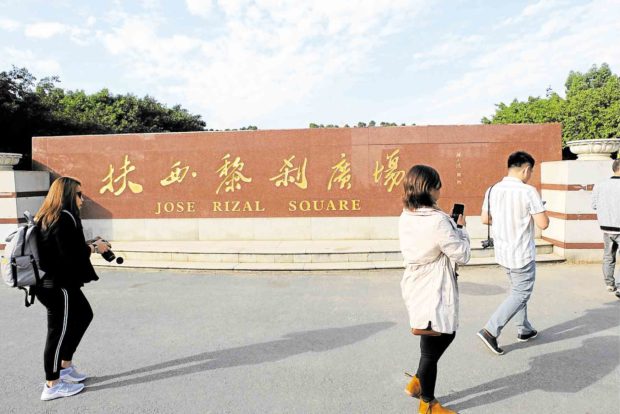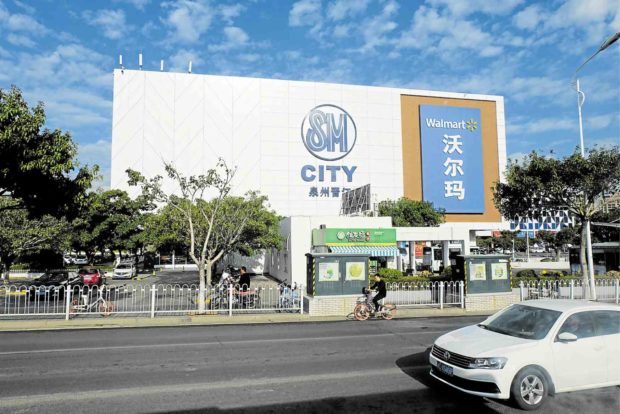Ties with Chinese city cited for boosting Mindanao tourism, trade

GLIMPSES OF PH Jinjiang City in Fujian, China, provides a glimpse of the Philippines through Jose Rizal Square—PHOTOS BY BONG SARMIENTO
DAVAO CITY—Agricultural products from Mindanao have reached the booming southeastern Chinese province of Fujian, whose residents are also boosting tourist arrivals here.
Luo Guansheng, deputy director of the Foreign Affairs Office of the Fujian Provincial People’s Government, attributed this growing tourism and trade ties to the sisterhood pact inked between Davao and Jinjiang cities last year.
Jinjiang is a county-level city in Fujian with about 2 million people and is slightly larger than Davao City.
Also last year, direct flights were launched between Davao and Jinjiang. The route is being served by Chinese airline Xiamen Air twice a week.
“The potentials for our future cooperation is very huge,” Luo told Mindanao-based journalists on an exposure trip to Fujian recently.
Article continues after this advertisementHuang Yiming, president of the Fujian Your Tour International Travel Agency Co. Ltd., noted a 50-percent increase in the number of Chinese tourists coming to Davao following the availability of a direct flight.
Article continues after this advertisementFor the first half of 2019, Huang said at least 4,000 Chinese, who sought his travel agency’s services, flew directly to Davao as tourists.
Tourist spending
Huang estimated that a Chinese tourist would spend an average of P145,000 for five days “for accommodation, food, sightseeing, island-hopping and shopping.”
The amount excludes visa fees and airfare, Huang added.
Speaking through an interpreter, Huang said a steady economic boom had led to rising incomes among Fujian’s close to 40 million people, driving them to travel and explore the world.
On the other end of the route, Luo said some 30,000 Filipino tourists visited Fujian last year, and some 10,000 during the first nine months of 2019.
Li Lin, Chinese consul general in Davao City, said a growing number of Filipinos had applied for tourist visas to visit Fujian, considered the gateway to China’s Maritime Silk Road.
PH symbols
Several Filipino cultural symbols can be found in Jinjiang. One is a public square dedicated to Philippine national hero, Jose Rizal, and another, an SM City shopping mall.
Rizal and the late Chinese-Filipino business magnate Henry Sy are said to have roots in Fujian.
In terms of trade, agricultural products from Mindanao such as coconuts and mangoes have become popular among Chinese households, and avocado has a potential huge demand, noted Luo.
Lin revealed that more Chinese investors have been flying to Davao to seek business opportunities.
He pledged to sustain the growing tourism and trade ties between southeastern China and the southern Philippines.
“China’s cooperation with the southern part of the Philippines will be brought to a higher level. [With that], Mindanao is going to contribute more significantly to China-Philippine relations,” the envoy said.
Cooperation
Davao Mayor Sara Duterte earlier said the sisterhood pact between Davao and Jinjiang cities sought to establish cooperation in the fields of tourism, trade, culture, education and technology.
“[The sisterhood ties] will foster an exchange of ideas on identified fields and bring the people of our two cities closer, [thus] strengthening the bilateral ties between our two nations even further,” she said.
Besides Jinjiang, Davao also forged a sisterhood pact with China’s Nanning City, the capital of Guangxi Zhuang Autonomous Region.
